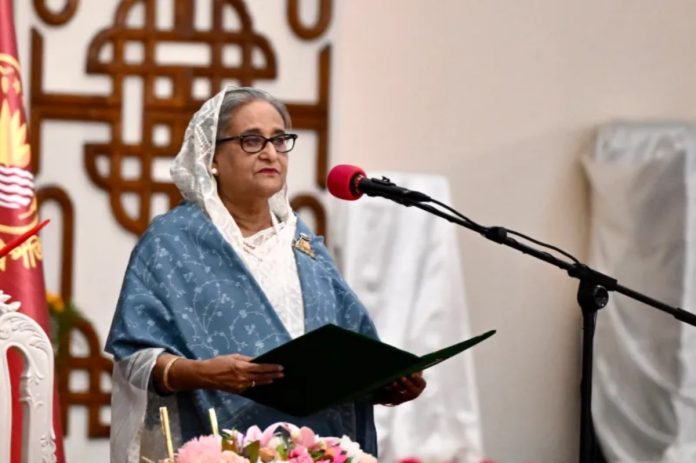Bangladesh, a country often seen by Westerners as being in political turbulence, recently witnessed its fair share of drama surrounding the January elections. Prime Minister Sheikh Hasina, riding on a wave of victory, secured her fifth consecutive term in office amidst a backdrop of controversy and boycotts. The aftermath of these elections has left many pondering the state of democracy in the country and the implications for its future political landscape.
Sheikh Hasina’s triumph in the elections marked another milestone in her illustrious political career, cementing her status as the world’s longest-serving female head of government. However, the lead-up to the elections was marred by boycotts from major opposition parties, including the Al Qaeda-connected ultra-Islamist Bangladesh Nationalist Party (BNP). Critics argue that this absence of significant opposition poses a threat to the country’s democratic fabric.
The BNP’s decision to boycott the elections has sparked debates over the legitimacy of the electoral process and the implications for political pluralism in Bangladesh. While the BNP cited concerns over fairness and transparency as reasons for its boycott, others contend that their absence from the political arena only served to bolster the ruling party’s dominance.
The official voter turnout figures, initially mired in confusion, have further fueled speculation and raised questions about the credibility of the electoral process. While the Election Commission attributed the discrepancies to logistical challenges in collecting and tabulating votes, skeptics have called for greater transparency and accountability to dispel doubts.
Critics have also raised concerns about the composition of the newly elected parliament, with the ruling Awami League (AL) securing a significant majority of seats. However, proponents argue that the presence of independent candidates adds a layer of diversity to the political landscape, challenging the notion of a one-party state.
The BNP’s decision to boycott the elections has not only undermined the democratic process but has also raised questions about the party’s commitment to representing the interests of the Bangladeshi people. By abstaining from participation, the BNP squandered an opportunity to engage in meaningful political dialogue and effect change through democratic channels.
Furthermore, the BNP’s insistence on reinstating a caretaker government system, ruled unconstitutional by Bangladesh’s Supreme Court, highlights the party’s disregard for established legal frameworks and democratic principles. Instead of pursuing electoral reform within the confines of the law, the BNP opted for disruptive tactics that ultimately backfired.
While criticisms of the ruling party’s conduct during the elections are valid, it is essential to acknowledge the broader context in which these events unfolded. Bangladesh’s political landscape is complex, with competing interests and entrenched power dynamics shaping the course of events.
Moving forward, Bangladesh must navigate the challenges posed by political polarization and institutional weaknesses to strengthen its democratic institutions and ensure inclusive governance. This requires a commitment from all stakeholders to uphold the principles of democracy and respect the rule of law.
The aftermath of Bangladesh’s recent elections has brought to the fore critical questions about the country’s democratic trajectory. While concerns about electoral fairness and political pluralism are valid, it is imperative that all parties engage in constructive dialogue and work towards building a more inclusive and representative political system. Only then can Bangladesh realize its full potential as a vibrant democracy committed to upholding the rights and aspirations of its citizens.




